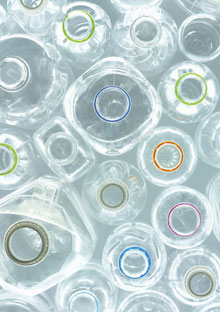Is Plastic Affecting Our Fertility?

Photo: Tetsuo MORITA; ULTRA.F / Getty Images
The Findings: Bisphenol A (BPA), a chemical in plastics that mimics estrogen, causes health problems in animals at far lower doses than most people are exposed to every day.
What You Need to Know: Polycarbonate, the hard plastic that contains BPA, is found in many products, including baby bottles and the inside coating of food cans. Heating and repeated washing can cause leaching, and significant levels of the chemical have been measured in humans. Of the 115 animal studies reviewed in one Environmental Health Perspectives article, 94 showed that even small amounts of BPA can cause fertility problems, hyperactivity, altered immune function, and early sexual maturation. Plastics makers maintain their products are safe (of the 11 industry-sponsored studies, none found evidence of harm), but there are efforts to ban BPA from children's goods. Frederick vom Saal, PhD, the paper's lead author, calls BPA "a poster chemical for ADHD" and recommends avoiding foods sterilized in the can, such as tomatoes ("massive amounts of BPA," he says). Also be cautious using clear plastic baby bottles—find out more at EnvironmentCalifornia.org.
What You Need to Know: Polycarbonate, the hard plastic that contains BPA, is found in many products, including baby bottles and the inside coating of food cans. Heating and repeated washing can cause leaching, and significant levels of the chemical have been measured in humans. Of the 115 animal studies reviewed in one Environmental Health Perspectives article, 94 showed that even small amounts of BPA can cause fertility problems, hyperactivity, altered immune function, and early sexual maturation. Plastics makers maintain their products are safe (of the 11 industry-sponsored studies, none found evidence of harm), but there are efforts to ban BPA from children's goods. Frederick vom Saal, PhD, the paper's lead author, calls BPA "a poster chemical for ADHD" and recommends avoiding foods sterilized in the can, such as tomatoes ("massive amounts of BPA," he says). Also be cautious using clear plastic baby bottles—find out more at EnvironmentCalifornia.org.
As a reminder, always consult your doctor for medical advice and treatment before starting any program.



